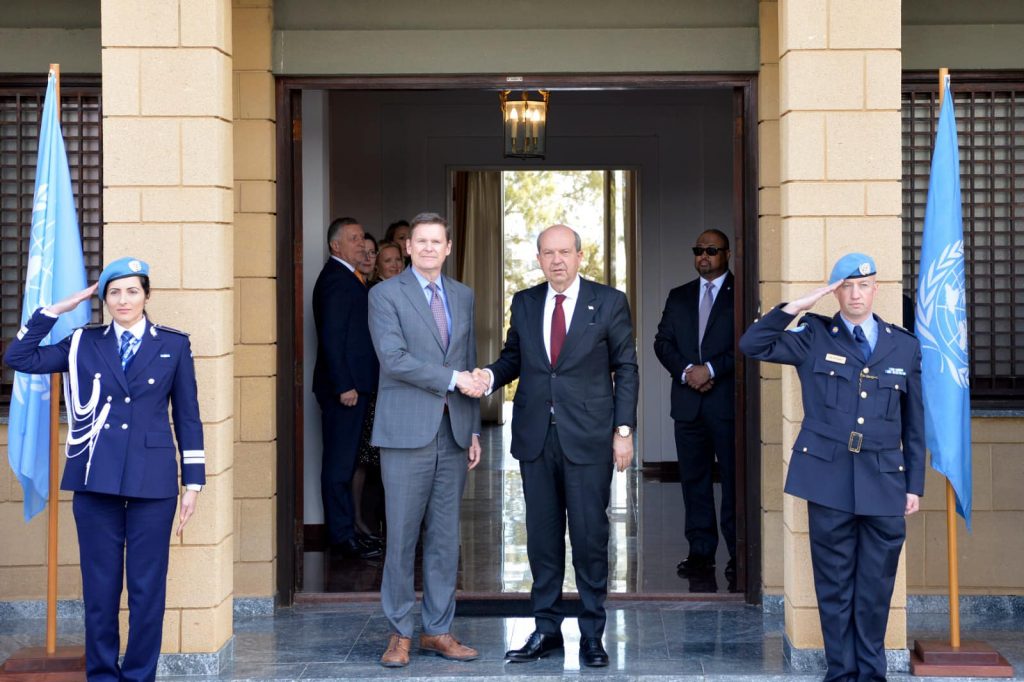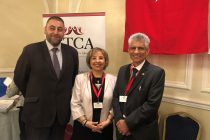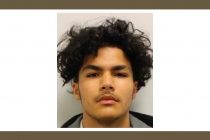Thursday saw President Ersin Tatar of the Turkish Republic of North Cyprus (TRNC) come together with the newly elected Greek Cypriot leader, Nikos Christodoulides, in the buffer zone in the capital Lefkoşa / Nicosia.
The meeting, which ran for nearly two hours, took place under the auspices of the UN Secretary General’s Special Representative for Cyprus and the UNFICYP Chief of Mission in Cyprus, Colin Stewart.
While Christodoulides, 49, has met the Turkish Cypriot leader before in his former role as Foreign Minister of South Cyprus, this was the first time the two men had met as leaders.
Christodoulides recently scored electoral success in the Presidential Elections in the South, beating his former presidential colleague Andreas Mavroyiannis in the run-off on 12 February, taking 51.97% of the vote to Mavroyiannis’ 48.03%, with an electoral turnout of 72.45%. He will be formally sworn in as the Greek Cypriot President on 28 February.
The UNFICYP chief had visited both leaders ahead of their Thursday meeting, which was described as “open and constructive.” No new date has been set for a follow-up meeting.
Speaking to media after meeting, the Turkish Cypriot leader said that he had discussed a variety of issues with his Greek Cypriot counter-part, including their respective stance on resolving the long-running Cyprus dispute.
President Tatar stated that the Greek Cypriot leader had extended his condolences to Turkish Cypriots who died in the Feb. 6 earthquakes in Türkiye, and had also stressed the need to co-operate on issues such as the earthquake response and health.
In his post-meeting conference, Christodoulides said that “The present state of affairs cannot be the solution to the Cyprus problem, not for Greek Cypriots, or Turkish Cypriots.”
He said he has not been surprised by the comments and stance of Turkish Cypriot leader, and during the meeting had expressed his “readiness…to do whatever I can to break the deadlock.”
A federal solution looking highly unlikely
It is difficult to see a path towards reconciliation between the two Cypriot sides, politically split since December 1963, under a new federal umbrella.
President Tatar was elected on a two-state solution mandate. He demands equal sovereignty and equal international status for Turkish Cypriots. Pointing to 50 years of failed negotiations, he wants the Greek Cypriot side to recognise this fundamental principle of equality before he sits down for a new round of talks.

Greek Cypriots and Turkish Cypriots are co-founders of the Republic of Cyprus, but the island’s power-sharing arrangement was short-lived after the larger Greek Cypriot community staged a coup and took control of the government in December 1963. The world, led by Britain, has treated the Greek Cypriot side as the sole authority on the island ever since, while relegating the status of Turkish Cypriots to a mere community, and consequentially removing any incentive for the Greek Cypriots to compromise and share power.
Since the late 1970s, the UN has been tasked with brokering a new political solution that will see the island reunited under a bi-zonal, bi-communal federal solution. A referendum in 2004, seven days ahead of Cyprus joining the EU, was held to reunite the island but the Greek Cypriots rejected the internationally-backed unification plan. More talks have followed since.
As the then foreign minister, Christodoulides accompanied President Nicos Anastasiades to Switzerland for the Crans Montana talks in 2017, meeting with TRNC leader Mustafa Akıncı – Tatar’s predecessor and staunch unification advocate. The two sides came within a whisker of reaching a permanent settlement of the decades-old Cyprus dispute, with Turkiye even ready to give up on the Guarantor system to get a deal over the line, but Christodoulides reportedly advised Anastasiades to walk away from the talks.
The collapse of the negotiations at Crans Montana was widely regarded as the end of any real prospect for unification of the island under a federal settlement.

Akıncı was beaten by Tatar in the TRNC Presidential Election in October 2020, and Ankara has since thrown its weight behind the new two-state strategy.
In September of last year, President Recep Tayyip Erdoğan invited the international community “to formally recognise the Turkish Republic of North Cyprus as soon possible” in an historic speech at the 77th session of United Nations General Assembly.
Two months later, the TRNC was formally accepted as an Observer Member at the Organization of Turkic States (OTS). Member states include Azerbaijan, Kazakhstan, Kyrgyzstan, and Turkiye, with EU member Hungary also an Observer Member of the OTS.





